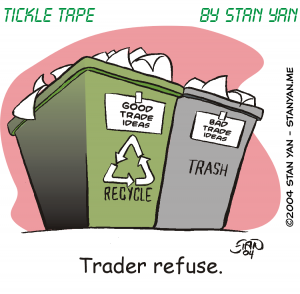Everyone likes to win, but is a need to win merely an attempt to avoid losses? Success requires facing setbacks nonchalantly, but there may be some traders who imbue losses with great psychological symbolism. In his book, “Investor Therapy,” Dr Richard Geist describes how some traders see losses, consciously or unconsciously, as reliving significant personal losses in their lives. What do losses mean to you? Is a trading loss just a loss, or does it mean something more?
According to Dr Geist, “Investors who have grown up experiencing unresolved losses often have specific difficulties selling their stocks.” Unresolved losses can make it difficult for traders to take a loss, and they may do irrational behaviours to avoid facing a loss, such as keeping losses on paper. Some people may sell stocks early in order to lock in profits, even though holding the position longer would have produced greater profits. Arbitrary sell rules, such as selling after a stock price dips 8%, may reflect a hidden need to avoid extreme loss. Loss is a part of life, but some people have great difficulty taking a loss, or any kind of a setback, in stride. Losses and setbacks mean too much to them personally.
As much as it may be difficult, traders must trade stocks impersonally and objectively. But that can be difficult if you tend to imbue a trade with symbolic meaning. If you think, for example, “This is just like when my best friend said I would never amount to anything,” you will make a stock trade a bigger deal than it is. Now, you might counter with, “It is a big deal. Money is on the line and I might lose it.” Well, that may be true, but if you constantly think of the potential negative consequences of trade, how much you could lose and how bad it will feel, then you will not be able to trade freely and creatively. You’ll dread making a trade. You’ll overly worry about what will happen, and you will eventually crack under the subtle strain you put on yourself.
If you are the kind of trader who just cannot see trade as anything more than a business transaction, it will be hard to completely rid yourself of your tendency to imbue a trade with great personal significance, but it is essential to try to trade in a carefree manner. Remind yourself that you have a choice: it is your decision to make a big deal over a commonplace event.
If you tell yourself it is not important, it will not be. But you can’t wait until you make a trade before you practice convincing yourself that trading is just an impersonal work activity. If you are prone to overly personalize trading, you must repeat a mantra proclaiming ordinariness to yourself all day and every day: “It’s just a work product and nothing more.” It may sound extreme, but that’s the kind of mental reprogramming you need to practice. How can you undo years of wrongly believing that any loss or setback, no matter how minor, has significant meaning for your inner-worth? It’s hard, but it is not hopeless.
Reminding yourself over and over again that accepting losses are a necessary part of life, and an essential part of winning will help you get ready for taking a loss. It will help you prepare for the losses that are an inevitable part of life. Don’t let your aversion for losses impact your trading decisions. Losses are no big deal. It’s not the number of losses you experience as a trader, but it’s how you recover from them. And in the end, if you make more money on your winning trades than you lose on your losing trades, there’s no reason to even think about how much you have lost. A loss is just a loss if you decide to see it that way.


